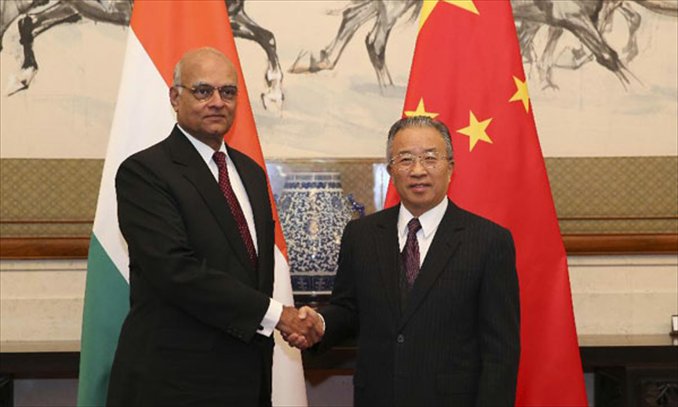China, India play down border spat

China and India should overlook "noises" that might divert friendly cooperation between the two countries, Chinese State Councilor Dai Bingguo, who is also the Chinese special representative on China-India boundary talks, told his Indian counterpart Shiv Shankar Menon in Beijing on Monday.
Their meeting was supposed to be the 16th round of China-India border talks but has now been reclassified as an informal talk. Indian media said this is because Dai is due to retire in March, when the new Chinese government will name a new special representative to lead the border talks.
The two countries should have a clear idea about some parties' intentions of undermining bilateral ties, and should also remember that there is more consensus than differences, and more cooperation than competition between China and India, Dai told the Indian national security adviser, according to the Xinhua News Agency.
Dai was apparently referring to the latest passport map row between Beijing and New Delhi.
In its new microchipped passports, China lays out a map to include territories that are also claimed by India, the Philippines and Vietnam. India responded by issuing visas stamped with its own version of the borders.
US State Department spokeswoman Victoria Nuland said last week that the US had concerns about China's map causing "tension and anxiety" in the region.
Menon said on Monday that India would not take part in any plot designed to contain China.
Menon, who arrived in Beijing on Sunday for a three-day visit, also met Chinese Foreign Minister Yang Jiechi on Monday and is scheduled to meet Wu Bangguo, the head of the National People's Congress, and is scheduled to call on Chinese Vice Premier Li Keqiang on Tuesday.
The Press Trust of India (PTI) news agency said Menon's visit is mainly aimed at "making formal contacts with the new Chinese leaders." An Indian embassy official declined to comment on the visiting agenda of the former Indian ambassador to China.
In addition to talks with Chinese leaders, Menon will also release a book of a Chinese translation of the works of Professor P. C. Bagchi, regarded as India's most eminent scholar on Chinese culture. He will also deliver a talk on India-China relations at the Indian embassy on Tuesday, according to the PTI.
Sino-Indian border talks, initiated in 2003, are now locked at the second stage of an agreement on a framework to settle the boundary. The next step will involve actual demarcation of a boundary.
During their talks on Monday, both Dai and Menon reiterated a previous agreement to maintain peace and stability in the border region and not to let border issues affect the two countries' ties in other areas.
Despite little hope of a major breakthrough in the border talks, analysts are still optimistic for the development of ties between the two countries.
"The Indian government is not in a position to settle the border issues with China now. Many documents regarding the 1962 China-India border conflicts are yet to be declassified in India, and the Indian public has been misled in perceiving that part of history," said Sun Shihai, a South Asian issues researcher at the Chinese Academy of Social Sciences.
"But at least we have a mechanism to negotiate about it now, which was unimaginable two decades previously," Sun added.
Wang Dehua, an expert on Indian issues from Shanghai Tongji University, agreed that just 15 rounds of talks are far from enough to solve the two countries' border disputes.
"If we become entangled in historical problems, the border disputes will never be solved," Wang said. "But if we are open to enhanced cooperation in other fields, including the military, and fully build trust, we can imagine a regional entity without borders anymore."
Agencies contributed to this story